 Petzlover
Petzlover Irish Bull Terrier is originated from United Kingdom but Schillerstovare is originated from Sweden. Irish Bull Terrier may grow 13 cm / 5 inches shorter than Schillerstovare. Irish Bull Terrier may weigh 7 kg / 15 pounds lesser than Schillerstovare. Both Irish Bull Terrier and Schillerstovare has almost same life span. Irish Bull Terrier may have more litter size than Schillerstovare. Both Irish Bull Terrier and Schillerstovare requires Low Maintenance.
Irish Bull Terrier is originated from United Kingdom but Schillerstovare is originated from Sweden. Irish Bull Terrier may grow 13 cm / 5 inches shorter than Schillerstovare. Irish Bull Terrier may weigh 7 kg / 15 pounds lesser than Schillerstovare. Both Irish Bull Terrier and Schillerstovare has almost same life span. Irish Bull Terrier may have more litter size than Schillerstovare. Both Irish Bull Terrier and Schillerstovare requires Low Maintenance.
 The Irish Bull Terrier is a variant of the Staffordshire Bull Terrier and is also known as the Irish Staffordshire Bull Terrie.
The Irish Bull Terrier is a variant of the Staffordshire Bull Terrier and is also known as the Irish Staffordshire Bull Terrie.
The dog isn’t particularly well known outside of Ireland and it is also unrecognized by any kennel clubs, although there are some dog organizations which recognize the Irish Staffordshire Bull Terrier and this includes the Dog Registry of America as well as the United National Kennel Club.
Although descended from the Irish Bulldog and the original Staffordshire Pit Terrier, the breed has also been influenced by other dog breeds such as the English White Terrier among others.
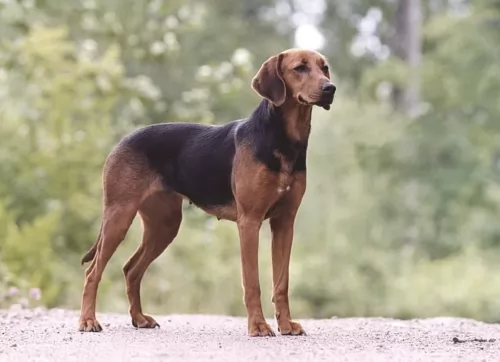 The Schillerstövare originated in Sweden, being named after a Swedish farmer, Per Schiller. After he died, the dog was named Schillerstövare in 1907, and was Sweden's first native dog breed.
The Schillerstövare originated in Sweden, being named after a Swedish farmer, Per Schiller. After he died, the dog was named Schillerstövare in 1907, and was Sweden's first native dog breed.
The Swedish Kennel Club recognised this dog in 1907 and it is also recognised by the Federation Cynologique Internationale as well as a number of minor kennels and dog clubs.
The dog has always been used as a hunting dog and the English Foxhound is the e foundation for this breed.
 Bred essentially for dog fighting, the Irish Bull Terrier, known also as the Irish Staffie, is a medium sized dog which stands at roughly 43 to 48cm and weighs in at anything from 14kg to 18kg.
Bred essentially for dog fighting, the Irish Bull Terrier, known also as the Irish Staffie, is a medium sized dog which stands at roughly 43 to 48cm and weighs in at anything from 14kg to 18kg.
The dog is muscular, lean and strong with a strong jaw, deep chest, a broad head, short muzzle with round, brown eyes. The ears are half-erect and he has a long, straight tail. The coat of the dog is short and smooth and in different shades of red, fawn, black and brindle. Sometimes there are white markings.
The Irish Staffie has an aggressive temperament when it comes to fighting other dogs, but he loves being with a human family, being a social dog.
Those who have owned the dog say he is a courageous, confident, strong-willed, affectionate, loyal pet who is playful and loves getting up to mischief. He is intelligent too and can be easily trained and socialized, getting on well with children in the home.
This dog seems to have a constant grin on his face and he just loves life. He loves working hard and playing hard and even though he has a history of fighting, with people he is loving and devoted.
He is boisterous and better suited to a strong-minded, active family as he tends to be stubborn, wanting his own way. He can adapt well to life in the city or the country, but wherever he lives, he will require his owners to give him a good amount of exercise.
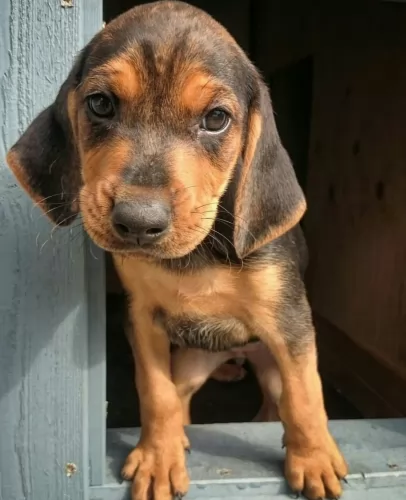 The Schillerstövare is a medium to large sized dog. They’re athletic and muscular.
The Schillerstövare is a medium to large sized dog. They’re athletic and muscular.
Standing at between 53–61cm in height and weighing in the region of 18–25kg, the coat of the dog is fairly short and harsh, with the color being black and tan.Sometimes you’ll see some white markings on the chest and paws.
The head is domed, the eyes brown, bright and alert and the ears of the dog are broad, medium length and floppy. The long tail is carried low or held out when running or alert.
If you allow your Schillerstovare to have puppies, you can expect between 3 to 7.
The Schillerstovare is a calm dog but he can get petty lively when there’s a game to be had. He gets on well with well disciplined children who have been taught to be kind and respectful to animals. He also gets on well with pets in the home. Just like with most other dogs, he will need to be trained and socialized as he is a strong willed, confident, dominant dog.
He is friendly and active but will be somewhat reserved around strangers.These dogs will require a lot of exercise and will need quite a bit of space too. They aren't well suited to small properties in the city. He will need a daily walk but also a chance to get off his leash and run free in the park. Other forms of exercise such as hikes, ball game and swimming will delight him.
 Lots of contact from his human family is what your Irish Bull Terrier will want from you. He is a loving, social dog and close human contact as well as lots of good food and exercise is what he will require from you.
Lots of contact from his human family is what your Irish Bull Terrier will want from you. He is a loving, social dog and close human contact as well as lots of good food and exercise is what he will require from you.
With training and socialization he becomes an awesomely obedient pet, getting on well with adults and children in the home. He is such an entertaining, happy dog and once you've had an Irish Bull Terrier you will find your home empty without one.
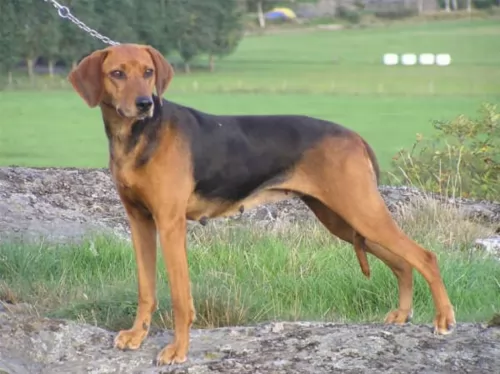 Schillerstovares are social, loving, friendly, loyal dogs who enjoy being around their human family. He’s going to need a lot of exercise, both mental and physical to keep him from boredom and frustration.
Schillerstovares are social, loving, friendly, loyal dogs who enjoy being around their human family. He’s going to need a lot of exercise, both mental and physical to keep him from boredom and frustration.
He will rely on you for at least a daily walk. He is strong-will and confident and will do well in a family where they are active and where they are firm, patient, kind and consistent in their behaviour towards him because then he ticks all th right boxes for being a splendid pet.
 Looked after well, your Irish Bull Terrier can reach 14, 15 or 16 years of age. Just like with other dogs, he is prone to some common dog illnesses, of which eye illnesses can be one.
Looked after well, your Irish Bull Terrier can reach 14, 15 or 16 years of age. Just like with other dogs, he is prone to some common dog illnesses, of which eye illnesses can be one.
Production and drainage of fluid is supposed to be balanced in the eye, and Glaucoma comes about when this balance is disrupted. Symptoms include red eye, pain, increased tear production and corneal cloudiness. Your vet may recommend treatment that will decrease inflammation in the eye.
The lens of the eye is usually clear but sometimes it develops a cloudy cataract which blocks light from reaching the back of the eye. The result is poor vision and even blindness. Cataract surgery is available for dogs and your vet can advise you further.
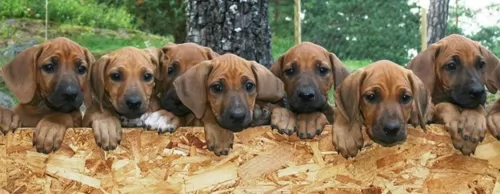 Even though your Schillerstovare is a healthy dog breed, hip dysplasia is a common dog disease that many dogs get.
Even though your Schillerstovare is a healthy dog breed, hip dysplasia is a common dog disease that many dogs get.
This is a skeletal disease when a dog’s hip joints become partially dislocated. It can be very difficult for your dog to get around, and he can also develop arthritis. It gets very sad when your dog doesn’t even want to participate in games anymore.
 An Irish Staffordshire Bull Terrier isn't going to require you spending a lot of money on him in terms of grooming. He is a low maintenance dog and his short, smooth coat will only require a good brush once or twice a week as he isn't a heavy shedder.
An Irish Staffordshire Bull Terrier isn't going to require you spending a lot of money on him in terms of grooming. He is a low maintenance dog and his short, smooth coat will only require a good brush once or twice a week as he isn't a heavy shedder.
Brushing him has several advantages – he loves the attention you’re giving him, its a time to check on fleas and ticks and it is excellent conditioning therapy for his coat. A damp cloth can also be used to wipe him down, and this is far better than bathing him with a shampoo that could aggravate his skin.
Your Irish Bull Terrier is an energetic breed and he certainly won't do well in a home where the family leaves him to his own devices day after day in the back yard.
Social and energetic, your pet will want to join you with your daily walks and he finds a ball irresistible. As a responsible dog owner, you will need to see that he gets a fair quota of exercise otherwise you should rather settle for a less active breed.
It goes without saying that such an active dog will require a good diet so ensure he can remain happy and active. Always try and feed your pet the best quality food there is.
If its commercially manufactured food, make sure its high quality and isn’t packed with unwholesome fillers and preservatives. Your vet can always offer sound advice on this aspect.
Some homemade food such as cooked chicken, brown rice and vegetables added to his kibble will do him the world of good and if you can afford it, mix in some raw meat from time to time. Make sure he has access to fresh, cool water.
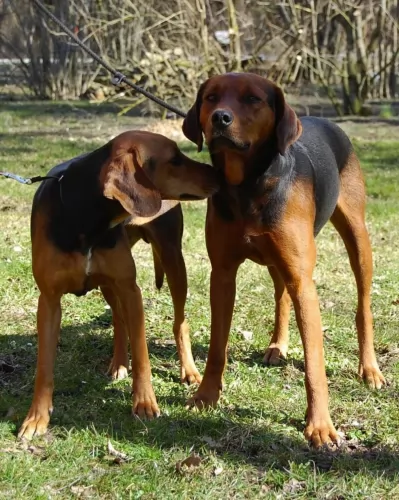 With his short coat, the Schillerstovare is considered a low maintenance dog and requires a minimal amount of grooming. Brushing should be done twice a week to remove loose hair. The harsh outer coat seems to repel dirt and dust.
With his short coat, the Schillerstovare is considered a low maintenance dog and requires a minimal amount of grooming. Brushing should be done twice a week to remove loose hair. The harsh outer coat seems to repel dirt and dust.
Trim your pet’s nails, check inside his ears for signs of redness, make sure his eyes are bright and clear and make sure he doesn’t have any unusual lumps on him.
Make sure his vaccines are up to date to avoid deadly canine diseases. Take him to the vet when you suspect he isn’t his normal self.
Dogs, just like humans, do well on good, nutritious diets. Feed a human lots of junk food and sweets and they’ll grow up to be obese and unhealthy. That's exactly how it is with dogs too. Some of the best commercially manufactured dog foods are convenient and they can be good if you look at the top brands. Look for ones that cater for your dog’s age, size, breed and activity levels. This dry kibble can be made more inviting for your pet when you include some homemade food.
Dogs just want simplicity so that they don’t battle with digestive problems. Boiled chicken, sweet potatoes, brown rice or pasta, carrots and spinach will be wonderful for him when you chop the food up and add it into the dry kibble twice a week. See his tail wag and his brown eyes light up when he smells this treat. Some raw meat added up occasionally will also contribute to your pet’s heath.
Make sure he is never without a constant supply of fresh, cool water.